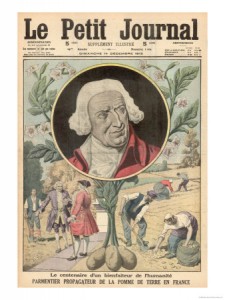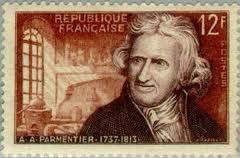 So, picking up on Monday’s tale of the potato’s rise to the status of staple food and, more specifically, the height of fashion: When France sent its army out against Frederick the Great’s in the Seven Year War, a 19-year-old pharmacist named Antoine-Augustin Parmentier signed up. He ended up locked in a Prussian prison, escaped, was recaptured, etc. until he served, by some accounts, a total of five stints in the cooler. Frederick, you’ll recall, had forced his starving Germanic masses to eat potatoes through the delicate wielding of the lash, and so Parmentier found himself eating nothing but during his stay.
So, picking up on Monday’s tale of the potato’s rise to the status of staple food and, more specifically, the height of fashion: When France sent its army out against Frederick the Great’s in the Seven Year War, a 19-year-old pharmacist named Antoine-Augustin Parmentier signed up. He ended up locked in a Prussian prison, escaped, was recaptured, etc. until he served, by some accounts, a total of five stints in the cooler. Frederick, you’ll recall, had forced his starving Germanic masses to eat potatoes through the delicate wielding of the lash, and so Parmentier found himself eating nothing but during his stay.
In spite of the fact that the potato was banned as human fodder in his home country because it was believed to cause leprosy, Parmentier did not, in fact, lose any digits. So when he made it home in 1763 and took the job of pharmacist at the Invalides Hospital, he tried to push the food. Alas, the Catholic Church ran the hospital, and we know how open they are to new and healthful ideas. Not even Parmentier’s win in a 1770 essay contest on “Foodstuffs Capable of Reducing the Calamities of Famine” changed their minds, nor the Paris Faculty of Medicine’s reclassification of the spud as legit food two years later. So Parementier searched his brain, scratched his long, cartoonish chin, and discovered his inner Charles Barnum.
At Louis XVI’s birthday party in 1786, Parementier presented the king and Marie-Antoinette a bouquet of potato flowers. Louis pinned a flower to his lapel, Marie wove a garland into her hair, and all of the aristocracy sat down to a dinner heavy on potato dishes. Louis gave Parmentier some acres outside of the city in which to experiment, and the upper class took to donning potato flowers to prove their grasp of modern fashion. Then Parmentier decided to post armed guards all around the fields in which he was experimenting. Nothing arouses interest like forbidden fruit, and when Parmentier pulled those guards off duty at night, the peasantry sacked the fields, delighted that to get a taste of how the Other Half lived.
Parmentier presumably retired to a charming farm cottage or a smart Parisian flat to live out the remainder of his days in glory. Before he did, he managed to survive the Revolution, perhaps because his primary claim to fame was convincing the poor, huddled masses to eat a potato rather than starve to death. However he pulled it off, Napoleon awarded him the Legion d’Honneur and appointed him the Inspector-General of the National Health Service. He died in 1813 at the age of 76, a handful of potato dishes named after him and the kind of odd, small-time national hero who don’t get statues. The French did give him, apparently, a stamp. Check it out:

